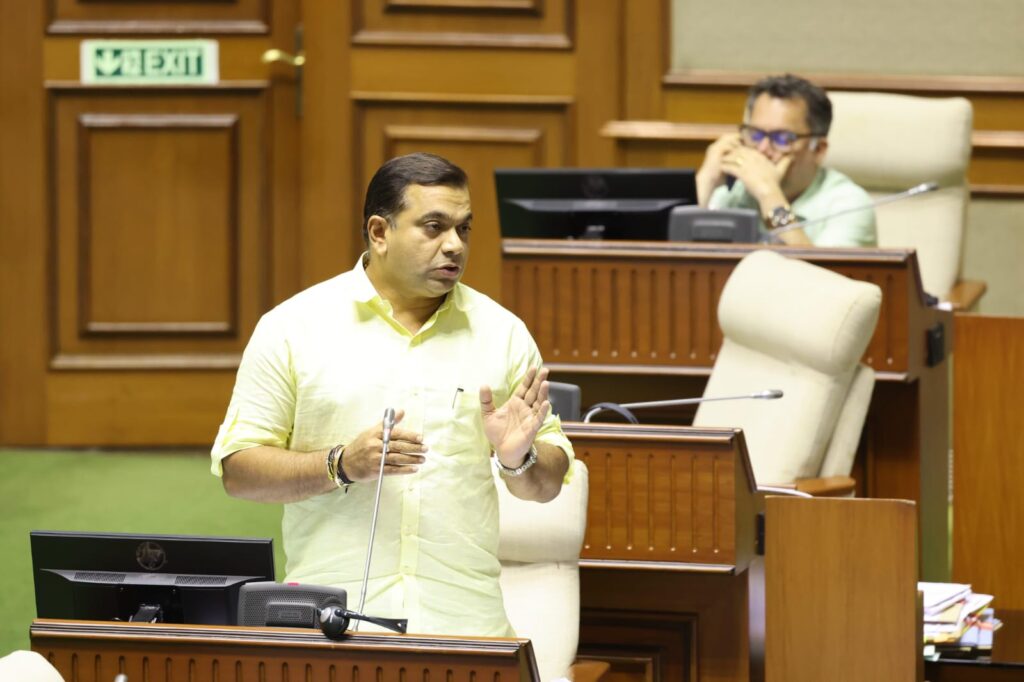
Information Technology Minister Shri. Rohan A. Khaunte, during the Goa Legislative Assembly session, highlighted the government’s collaboration with tech companies, emphasizing their potential to boost Goa’s GDP through emerging technologies. He announced that the Knowledge Center schemes aimed at empowering women will be implemented by September 30, 2024, and the EMC Tuem project is expected to be completed by October 2024. Discussing Goa’s progress in e-governance, he stated, “We are part of India’s E-district initiative, offering 241 end-to-end G2B services. With 7.8 lakh users, we have processed 28 lakh services and implemented a robust payment gateway. Additionally, our ‘Know Your Schemes’ platform provides access to 200 schemes across 21 departments.”
The minister elaborated on the Gramin Mitra Yojana, which aims to revolutionize government service delivery by providing doorstep access across the state. Citizens can initiate applications by contacting the helpline at 14471. Under the revised framework, they will pay Rs. 50 per service delivery out of the total Rs. 250 service charge. Moreover, DigiLocker services are available for a one-time update of services. The E-office digitization project, funded with a Rs. 30.25 crore interest loan, has onboarded 13-15 departments. Shri. Khaunte also discussed the potential of 3D printing, stating that the government is considering providing training to student groups in this area. Additionally, there are plans to implement GIS across all government accounts, which would introduce new facilities for the public.
Opposition members suggested streamlining government services and reducing costs. They also emphasized the need for increased support for women entrepreneurs, highlighted the importance of the Har Ghar Fiber connectivity initiative, and called for expedited progress on the EMC Tuem project.
Minister Khaunte responded, “We are nurturing startups with various initiatives such as First Friday, Founders Club, Masterclasses, and Corporate Bridge. Goa currently hosts over 200 startups, with 30% initiated by women. We actively promote this community through events and have conducted 14 startup yatras across colleges so far. “We are also creating infrastructure for digital nomads by providing high connectivity facilities on beaches at Ashwem and Morjim, and we are open to investors at Colva. The old godown at Junta House in Panaji will be converted into a co-working facility. Currently, Goa hosts over 300 digital nomads from across India. Tuem will become a cluster, generating job opportunities for locals.
Additionally, we have engaged with CII and the Karnataka Chamber of Commerce to attract investment,” stated the minister. Regarding the Har Ghar Fiber initiative, the minister assured that all households with electricity and water connections will receive internet connectivity.
Shri. Khaunte further explained that the computer scheme for scheduled caste and tribe members has been discontinued due to underutilization. The intended recipients were not attending the training programs as planned. Recognizing this issue, the scheme has been put on hold, with an acknowledged need for improvements in the training programs.
Several allegations were made against Goa BroadBrand Network (GBBN) initiative. Shri. Khaunte clarified that GBBN 1 and 2 have covered approximately two thousand locations. He explained that the contractor’s previous contract expired in 2019, causing a temporary halt in operations. Annual maintenance work was subsequently initiated, and related expenses were anticipated.
Members from the ruling party, including MLA Jennifer Monserrate, Premendra Shet, Alex Reginald Lawrence, Michael Lobo, Krishna Salkar, Deliah Lobo, Sankalp Amonkar, Ganesh Gaonkar, Kedar Naik, Rajesh Faldessai, Jeet Arolkar, Digambar Kamat, Nilesh Cabral, and Joshua De Souza, played a critical role in sharing vital information regarding Information Technology, Electronics, and Communications with the government. Mormugao MLA Sankalp Amonkar suggested implementing drone technology and training programs, initiating drone licensing in our state, and establishing a Drone Academy to attract students from outside Goa.
Opposition members, Yuri Alemao, along with MLA Venzy Viegas, Carlos Ferreira, Viresh Borkar, Altone D’Costa, Cruz Silva, Vijay Sardesai, also actively participated in economic discussions. They provided essential recommendations for the government. Viegas admired the Robotic Campus initiative and praised IT Minister Shri. Khaunte. Additionally, they recommended introducing coding education at the school level, organizing workshops focused on robotics and coding.
During the assembly speeches, the establishment of digital nomad facilities was proposed, including the provision of unobstructed internet through company fiber optics. Many members emphasized the need for improvements in rural network infrastructure. Additionally, the initiation of Wi-Fi hotspots was a common demand. They stated that Goa should always be prepared for the digital revolution in the Information Technology sector, even amidst objections.
The minister emphasized the need for collaboration with stakeholders and academia to achieve these goals.
